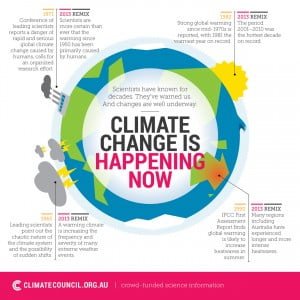
The Climate Council has released a summary of the most recent Intergovernmental Panel on Climate Change (IPCC) report. The Council draws attention to the increased scientific knowledge in this area which has led to the following observations:
- There has been a 0.85°C increase in global average air temperature since the start of the 20th century.
- Warming below 3000 metres in the North Atlantic and Southern Oceans has been observed.
- Oceans are 26 percent more acidic than at the start of the Industrial revolution.
The summary highlights the 40 percent increase in atmosphere carbon dioxide since the beginning of the Industrial Revolution. The increase in human activity has resulted in increases in global temperatures since the 1950s.
Increases in global temperature lead to more frequent and severe extreme weather events. This has already led to and may result in more hot days and nights, heavier rainfall and increased coastal flooding.
Countries who have signed up to the United Nations Framework Convention on Climate Change agreed to limit the rise in global temperature to 2°C from pre-industrial revolution levels. There has been an almost 1°C rise already; thus globally, only an estimated 1000 billion tonnes of carbon, referred to as the ‘carbon budget’, can be released into the atmosphere.
However, the Climate Council indicates that the carbon budget may actually be smaller than this due to warming from other greenhouse gases and potential releases of methane due to melting permafrost.
The summary also sets the record straight over recent misreporting on the draft IPCC report, in particular that the Earth has stopped warming since 1998.
The Climate Council replaces the governmentally funded Climate Commission, which was axed by the new Coalition Government in September.
For more information, visit the Climate Council website.







